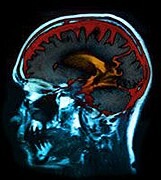It’s not clear why past drug dependence is linked to less gray matter in female brains, researchers say
TUESDAY, July 14, 2015 (HealthDay News) — Women formerly addicted to stimulant drugs, such as cocaine and methamphetamine, may have a smaller amount of gray matter in the brain, according to research published online July 14 in Radiology.
Scientists reviewed brain magnetic resonance imaging (MRI) exams in 127 men and women. The study included 59 people (28 women and 31 men) who were previously dependent on cocaine, amphetamines and/or methamphetamine for an average of nearly 16 years. The study also included 68 healthy participants (28 women and 40 men) who were similar in age to those who had been addicted to drugs. All of the previously dependent men and women in the study had been abstinent from stimulant-drug use for an average of 13.5 months at the time of MRI.
Compared to the women in the control group and the men in the study, the previously dependent women had less gray matter volume. “We are not sure why differences were so pronounced in the women but not the men in this study,” study author Jody Tanabe, M.D., a professor of radiology from the University of Colorado School of Medicine in Aurora, Colo., told HealthDay. “In fact, men had overall more drug-related symptoms than women so the results were somewhat surprising. Men and women did not differ in their drug exposure (regarding the various types of drugs they were exposed to), abstinence, or years of drug use. It may be that our findings reflect behavioral and personality differences.”
Exactly why these changes are occurring in the brain’s gray matter volume in women still isn’t clear, the study authors noted. “Since the brain consists of numerous cells and the spaces between cells, we do not know if some of the cells die, become smaller, or if the spaces between the cells become smaller,” Tanabe said.
Copyright © 2015 HealthDay. All rights reserved.








